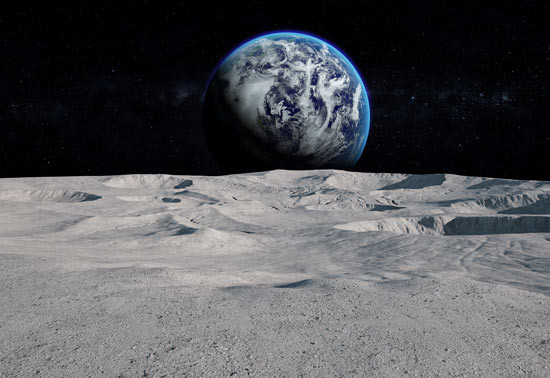A Moon Tax: The “Final Frontier” in Global Equity?

As humanity expands its reach beyond Earth, questions about governance, ownership, and taxation in outer space have moved from science fiction to urgent reality. Boston University School of Law alumnus Kevin Brown has previously proposed a groundbreaking solution: a "moon tax." This concept seeks to ensure that the profits and benefits from lunar exploration and resource extraction are equitably shared among all of humanity. With lunar missions ramping up and private companies eyeing the moon's untapped resources, Brown's 2022 idea is more relevant than ever.
What Is the Moon Tax?
The moon tax, as envisioned by Brown, involves imposing an excise tax on the physical occupation of the lunar surface. His plan divides the moon into one-square-kilometer plots, or "moon units," with fees levied on entities placing objects within these units. For example, charging $20,000 per moon unit could generate approximately $18 billion annually if just 2.5% of the lunar surface were utilized. This revenue could fund global initiatives such as climate change mitigation, poverty alleviation, or technological advancements.
Brown’s proposal aligns with the principles of the 1967 Outer Space Treaty, which designates outer space, including the moon, as the "province of all mankind." The treaty prohibits national appropriation, making a moon tax a potentially fair way to regulate and benefit from extraterrestrial activities without violating international law.
Why the Moon? Why Now?
The current relevance of this taxation framework is due to rapid advancements in lunar exploration:
● NASA's Artemis Program: This initiative aims to return humans to the moon by the mid-2020s. The program has already generated nearly $2.2 billion in tax revenue and created 37,000 jobs nationwide.
● Private Enterprise: Companies like Elon Musk’s SpaceX and Jeff Bezos’s Blue Origin are not only investing in moon missions but are also exploring the extraction of lunar resources like water ice, a potential source for fuel and life support.
● International Competition: Countries like China – who plans to send astronauts to the moon by 2030 – and India – with their Chandrayaan programme – have accelerated their lunar ambitions, which has brought the need for a unified approach to managing the moon's resources into the forefront.
As the moon transitions from a scientific curiosity to an economic frontier, questions about resource ownership, environmental impacts, and global equity become paramount. Without a regulatory framework, there’s a risk that lunar activities will mirror Earth’s history of resource exploitation and inequality.
Could a Moon Tax Really Work?
Advocates for a moon tax argue that it could address key challenges associated with lunar exploration:
Preventing Resource Hoarding: By taxing occupation and resource extraction, the moon tax could discourage monopolization by a few nations or corporations.
Funding Global Needs: Revenue from the tax could be used to tackle global challenges such as climate change or funding underdeveloped nations' space programs.
Encouraging Sustainability: Taxation could incentivize responsible use of lunar resources, minimizing environmental damage and preserving the moon for future generations.
Kevin Brown explains, “A moon tax is not just about revenue; it’s about ensuring that humanity’s leap into space uplifts everyone, not just those with the resources to get there.”
The Challenges of Implementation
Despite its potential, implementing a moon tax would face significant obstacles:
● International Cooperation: The tax would require a new global regulatory framework, involving major spacefaring nations and private enterprises.
● Enforcement: Monitoring and taxing lunar activities would demand advanced tracking technologies and robust oversight mechanisms.
● Equity Concerns: Deciding how to allocate the revenue—whether to fund global programs or reinvest in space exploration—would be contentious.
Critics argue that such a tax could stifle innovation and discourage private investment in space. However, proponents counter that a lack of regulation could lead to a “wild west” scenario, where the wealthiest entities claim disproportionate control over extraterrestrial resources.

Learning from Earth's History
History provides valuable lessons for this new frontier. The exploitation of Earth’s resources has often led to environmental degradation and socio-economic inequalities. Without proactive measures, similar patterns could emerge on the moon. A moon tax could serve as a preventive measure, ensuring that the benefits of space exploration are shared equitably.
For example, the International Seabed Authority regulates mineral-related activities in international waters, providing a precedent for managing shared resources. Adopting a similar model for space could provide a framework for implementing Brown’s moon tax proposal.
As space exploration accelerates, the moon tax represents a bold vision for ensuring that humanity’s extraterrestrial endeavors benefit all. The resources of the “final frontier” must be shared responsibly and equitably so we can uphold the ideals of shared heritage and mutual advancement. Kevin Brown’s proposal serves as a timely reminder that as we reach for the stars, we must also consider the broader implications for the universe as a whole.
Want our best tax and accounting tips and insights delivered to your inbox?
Sign up for our newsletter.